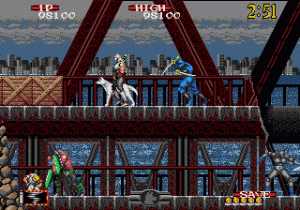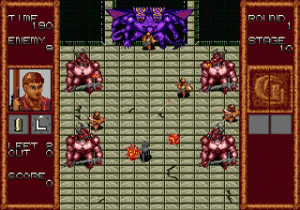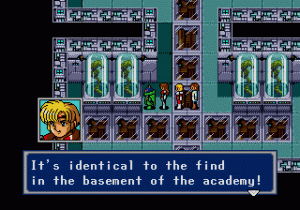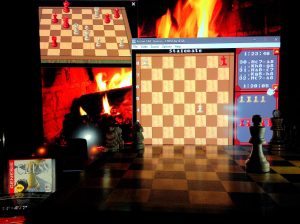It’s great how most old games only age in years, continuing to stand the test of time even as more modern consoles replace them. Sega’s machines are home to many timeless classics, and there’s a nice feeling to going back and exploring some of the titles that slipped by earlier or just revisiting a favorite title. This month, we have a nice selection of classics from our staff and readers, so see what they were playing in February!
Shadow Dancer: The Secret of Shinobi By Ken Horowitz
 The Shinobi series has always been among my favorite, maintaining a pretty good consistency level over the last 30 years. The Genesis version of Shadow Dancer in particular holds a special place for me, after being underwhelmed by the arcade game. Not that it’s bad; it’s just that it seemed a little to vanilla for me, and it felt like a step back after having played The Revenge of Shinobi. Thankfully, the Genesis port is much improved, and it is the definitive version, in my mind. The presentation is excellent, the gameplay is solid, and the levels are varied and challenging. It still retains the feel of the arcade original, which was in the vein of the first Shinobi, but it’s right at home alongside its two Genesis brothers. I find the last boss battle to be kind of anticlimactic, but overall I’m very happy going back every so often and giving Shadow Dancer some play time.
The Shinobi series has always been among my favorite, maintaining a pretty good consistency level over the last 30 years. The Genesis version of Shadow Dancer in particular holds a special place for me, after being underwhelmed by the arcade game. Not that it’s bad; it’s just that it seemed a little to vanilla for me, and it felt like a step back after having played The Revenge of Shinobi. Thankfully, the Genesis port is much improved, and it is the definitive version, in my mind. The presentation is excellent, the gameplay is solid, and the levels are varied and challenging. It still retains the feel of the arcade original, which was in the vein of the first Shinobi, but it’s right at home alongside its two Genesis brothers. I find the last boss battle to be kind of anticlimactic, but overall I’m very happy going back every so often and giving Shadow Dancer some play time.
Gain Ground By David Dyne
Gain Ground is amazing. It’s even more amazing than the time Michael Jackson came over to my house to use the bathroom. And if you can figure where that came from; a No Prize to you! I’ve been playing the Genesis, Master System, and PC Engine Super CD versions and I love them all for their own take on the arcade game. Sure, some versions are closer than others, but each one feels just right to me.
 Each time I start playing I have my All-Star team of Johnny with his rifle, the three spear brothers: Ashra, Webad and Marty, the Professor, and Howie with the machine gun or pistol. Everybody else in the roster is a one-time use character or completely useless due to their slow speed or lack of firepower, and it hurts like hell to lose all your best characters late in the game. I often wonder why some of these guys are even in the roster in the first place, apart from being a decent support character in two-player mode.
Each time I start playing I have my All-Star team of Johnny with his rifle, the three spear brothers: Ashra, Webad and Marty, the Professor, and Howie with the machine gun or pistol. Everybody else in the roster is a one-time use character or completely useless due to their slow speed or lack of firepower, and it hurts like hell to lose all your best characters late in the game. I often wonder why some of these guys are even in the roster in the first place, apart from being a decent support character in two-player mode.
Round five is the farthest I’ve gotten so far, but I’ll keep persevering and will hopefully get to finish this one in the coming months.
Phantasy Star IV By Paige
Since November I’ve been playing through the original Phantasy Star series, and this month I’ve completed that journey with Phantasy Star IV. There’s not much I can say about this game that hasn’t already been said a million time before, so I’ll make it brief.
I found the overall feel of PS IV to be kind of strange. While this game would (naturally) share many of the game mechanics and story elements as the first three games, it does it in such a way that it almost pays homage to the earlier entries—all while still providing a satisfying conclusion to the story. I mean, really: there were so many throwbacks to the original game (some dungeons used the same dungeon song from Phantasy Star, and there was an entire town devoted to Alis and her heroism, among others); there were major plot twists a la Phantasy Star II (not to mention everyone was still dealing with the consequences of Rolf and Co.’s actions a millennium later); and as for Phantasy Star III… well, there was Wren, somehow. Even though parts three and four take place virtually simultaneously, Wren was able to be in two places at once, about 1000 spaceship-speed-years apart (or however far apart the locations of games three and four are). I’ve reconciled this by just assuming ‘Wren’ was the model of android, and not necessarily the name of the individual, sort of like Nei & Neifirst.
 I also found this game to be the easiest of the bunch, and did the best in terms of storytelling. It still required a lot of grinding, but the macro system made these field battles much less time-consuming (in terms of assigning moves). The dungeons were incredibly straightforward to navigate, and even in the more “maze-like” dungeons I was able to find the correct path without much trouble. Whether this was by dumb luck or the work of the level designers, I’m not sure. The numerous in-game cut scenes were entertaining, and it was so nice to see every character have such great personalities (except Chaz—what a twerp).
I also found this game to be the easiest of the bunch, and did the best in terms of storytelling. It still required a lot of grinding, but the macro system made these field battles much less time-consuming (in terms of assigning moves). The dungeons were incredibly straightforward to navigate, and even in the more “maze-like” dungeons I was able to find the correct path without much trouble. Whether this was by dumb luck or the work of the level designers, I’m not sure. The numerous in-game cut scenes were entertaining, and it was so nice to see every character have such great personalities (except Chaz—what a twerp).
Overall, I think that this game is easily the best of the 16-bit entries (in my opinion it beats out PS II by quite a bit), but I’m undecided if this is the best game in the whole, proper series. I have such a soft spot for the original Phantasy Star, and seeing that game pop up in so many places reminded me just how much I enjoyed it (and so improved my opinion of Phantasy Star IV). I guess I’ll just have to play through both games again sometime to find out for sure!
Chess By James Villone
This month included a suspenseful chess match with a good friend, one night at our favorite pub. We both played well, cautiously and carefully, with neither of us gaining a clear advantage. Our material and positioning kept pace with each other, and remained quite similar. My friend enjoyed a slight material advantage for most of the match, but my last move captured another one of his pawns, which made our material exactly the same. My friend then had to leave for a prior engagement, so we photographed the board, to finish the next time we see each other. This is something that we almost never do, and it was interesting, because I could potentially gain an advantage by studying the photo really well! I wanted to recreate the suspended board situation and really figure it out, so I turned to the customize-mode in my repro of Genesis Chess (which was an unofficial release of 1998, exclusive to Russia).
While I could have used my physical chess set to recreate our hanging match: Digital versions of chess have the advantage of convenience, in not using all the physical pieces. Plus, I could consult the title’s artificial-intelligence to see what it would calculate as our best moves! This might not sound exciting, but I had never done this for a suspended match before, so it actually was exciting. I set up the chess board the same as our photographed arrangement and let the AI play as my friend, who I thought was going to lose, from slightly inferior positioning. I was curious to see what the top-difficulty AI could do, in his shoes.
 As we can see in the screen-shot: My friend’s next move (as black/red) can not safely check my king, but then my following move certainly can check his king (with my rook), and this was why I had been feeling confident. I hoped to find a sequence of checking his king that would lead to checkmate.
As we can see in the screen-shot: My friend’s next move (as black/red) can not safely check my king, but then my following move certainly can check his king (with my rook), and this was why I had been feeling confident. I hoped to find a sequence of checking his king that would lead to checkmate.
Chess predicted the best moves that my friend can do. His king escaped to d7, out of reach of my knight, and it seemed that my positioning might not be so advantageous after all! I checked again with my rook (at f7) to see what might happen. His king responded by stepping out of check, and actually threatening my rook (from e8), so my rook was forced to flee, which at least let him kill another pawn (at h7). Soon his rook and knight teamed up to check my king and capture my knight. I had to find a better course of action!
I rewound back to my friend’s situation. Instead of that obvious rook’s check, I marched a pawn forward (to e5), but this approach didn’t really work out in my favor, either. I rewoundback and instead, tried starting out by using my rook to capture his pawn (h7). I had initially passed over this move for seeming insignificant, but it actually worked out to be my best course of action! That pawn-decrease made the board seem much safer; my king managed to avoid any serious threats; and the match continued quite closely, with the CPU choosing to trade knights with me at some point. Unfortunately, even that best course of action still brought us to a stalematish end, which I lost, and I still couldn’t decide if my suspended-positioning was really an advantage or if that was just a false impression.
I decided to consult the artificial-intelligence in a different way. Starting again from our suspended arrangement, I let the AI control both sides. This served to show the absolute best moves, for both of us! This eventually led to the very interesting conclusion of a stalemate (by repetition), as if that was the only outcome that the AI could calculate (if my friend and I both continue to play well).
I almost wanted to tell my friend that stalemate is inevitable, so we might as well consider it as such and just start a new match next time. But I found myself more interested to actually finish the match with him, after all this assessment! Despite the AI’s prediction of a stalemate, one of us can always still gain an advantage, if the other person makes any mistakes.
I bide my time and wait, like a medieval king with his surviving men, convalescing in some hidden forest clearing, during a lull in battle. I imagine us tending to our wounds, feasting and drinking jugs of wine, and mingling with the young ladies dancing around our camp, as we plot and scheme the bloody conclusion of the war!

Recent Comments